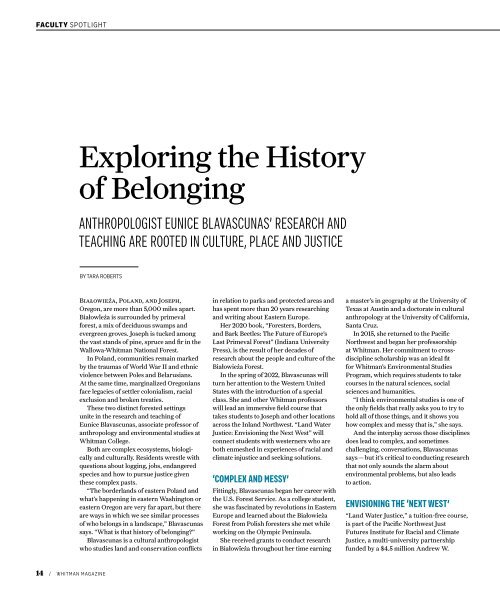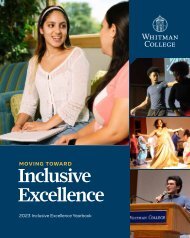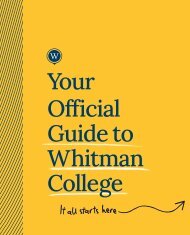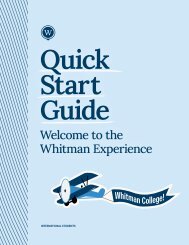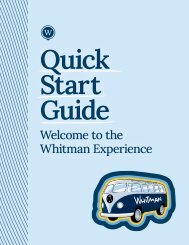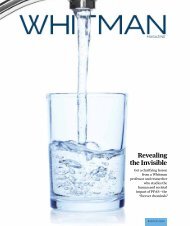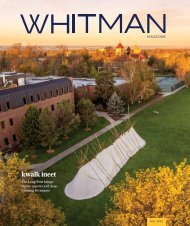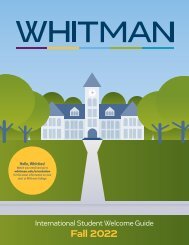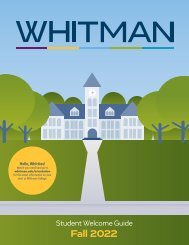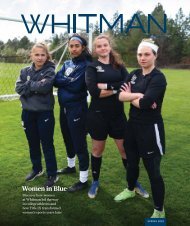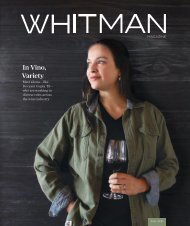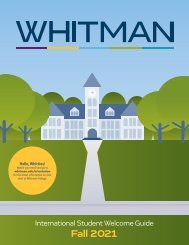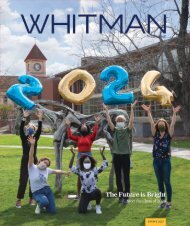You also want an ePaper? Increase the reach of your titles
YUMPU automatically turns print PDFs into web optimized ePapers that Google loves.
FACULTY SPOTLIGHT<br />
Exploring the History<br />
of Belonging<br />
ANTHROPOLOGIST EUNICE BLAVASCUNAS’ RESEARCH AND<br />
TEACHING ARE ROOTED IN CULTURE, PLACE AND JUSTICE<br />
BY TARA ROBERTS<br />
Białowieza, Poland, and Joseph,<br />
Oregon, are more than 5,000 miles apart.<br />
Białowieza is surrounded by primeval<br />
forest, a mix of deciduous swamps and<br />
evergreen groves. Joseph is tucked among<br />
the vast stands of pine, spruce and fir in the<br />
Wallowa-<strong>Whitman</strong> National Forest.<br />
In Poland, communities remain marked<br />
by the traumas of World War II and ethnic<br />
violence between Poles and Belarusians.<br />
At the same time, marginalized Oregonians<br />
face legacies of settler colonialism, racial<br />
exclusion and broken treaties.<br />
These two distinct forested settings<br />
unite in the research and teaching of<br />
Eunice Blavascunas, associate professor of<br />
anthropology and environmental studies at<br />
<strong>Whitman</strong> <strong>College</strong>.<br />
Both are complex ecosystems, biologically<br />
and culturally. Residents wrestle with<br />
questions about logging, jobs, endangered<br />
species and how to pursue justice given<br />
these complex pasts.<br />
“The borderlands of eastern Poland and<br />
what’s happening in eastern Washington or<br />
eastern Oregon are very far apart, but there<br />
are ways in which we see similar processes<br />
of who belongs in a landscape,” Blavascunas<br />
says. “What is that history of belonging?”<br />
Blavascunas is a cultural anthropologist<br />
who studies land and conservation conflicts<br />
in relation to parks and protected areas and<br />
has spent more than 20 years researching<br />
and writing about Eastern Europe.<br />
Her 2020 book, “Foresters, Borders,<br />
and Bark Beetles: The Future of Europe’s<br />
Last Primeval Forest” (Indiana University<br />
Press), is the result of her decades of<br />
research about the people and culture of the<br />
Białowieza Forest.<br />
In the spring of <strong>2022</strong>, Blavascunas will<br />
turn her attention to the Western United<br />
States with the introduction of a special<br />
class. She and other <strong>Whitman</strong> professors<br />
will lead an immersive field course that<br />
takes students to Joseph and other locations<br />
across the Inland Northwest. “Land Water<br />
Justice: Envisioning the Next West” will<br />
connect students with westerners who are<br />
both enmeshed in experiences of racial and<br />
climate injustice and seeking solutions.<br />
‘COMPLEX AND MESSY’<br />
Fittingly, Blavascunas began her career with<br />
the U.S. Forest Service. As a college student,<br />
she was fascinated by revolutions in Eastern<br />
Europe and learned about the Białowieza<br />
Forest from Polish foresters she met while<br />
working on the Olympic Peninsula.<br />
She received grants to conduct research<br />
in Białowieza throughout her time earning<br />
a master’s in geography at the University of<br />
Texas at Austin and a doctorate in cultural<br />
anthropology at the University of California,<br />
Santa Cruz.<br />
In 2015, she returned to the Pacific<br />
Northwest and began her professorship<br />
at <strong>Whitman</strong>. Her commitment to crossdiscipline<br />
scholarship was an ideal fit<br />
for <strong>Whitman</strong>’s Environmental Studies<br />
Program, which requires students to take<br />
courses in the natural sciences, social<br />
sciences and humanities.<br />
“I think environmental studies is one of<br />
the only fields that really asks you to try to<br />
hold all of those things, and it shows you<br />
how complex and messy that is,” she says.<br />
And the interplay across those disciplines<br />
does lead to complex, and sometimes<br />
challenging, conversations, Blavascunas<br />
says—but it’s critical to conducting research<br />
that not only sounds the alarm about<br />
environmental problems, but also leads<br />
to action.<br />
ENVISIONING THE ‘NEXT WEST’<br />
“Land Water Justice,” a tuition-free course,<br />
is part of the Pacific Northwest Just<br />
Futures Institute for Racial and Climate<br />
Justice, a multi-university partnership<br />
funded by a $4.5 million Andrew W.<br />
14 / WHITMAN MAGAZINE


